#or how swedes work with immigrants
Explore tagged Tumblr posts
Text
The cultural impact of KAJ on Swedish-Finnish relations
I wanted to highlight some positive things that I've observed around the KAJ-phenomenon (Swedish Eurovision entry 2025), while also clarifying a few things about the cultural context to those who aren't from the region - but my small overview got out of hand, so here is an essay-length cultural analysis (sorry about that and hats off to anyone who reads to the end!)
You can read the rest under the cut or on Reddit where there is also lots of interesting stuff in the comment section.
I'm interested in this topic because I'm part of the Swedish speaking minority in Finland, but also because I've lived in the Finnish speaking parts of Finland (Jyväskylä) and in Sweden (Malmö), so I've had a front-line seat to people from all of these communities making assumptions about each other and misunderstanding each other.
Here are the three geopolitical aspects of the KAJ-phenomenon that I find particularly noteworthy and heartwarming:
1) Sweden is celebrating Finnish culture and it's changing the narrative in both countries
The fact that a Finnish band is topping charts in Sweden with a song about an aspect of Finnish culture is a bigger deal than you might think, because Finnish culture has not traditionally been held in high esteem in Sweden.
There are some ancient reasons for this, related to the fact that Finland was under Swedish rule from the 13th century all the way up to 1809 with the power dynamics that this implies, but I think the most important reason is probably the wealth gap during much of the 20th century.
In the 1950-70s many Finns emigrated to Sweden for work. They were mostly known to be reliable hard workers, but new immigrants are never highly regarded and on top of that this was the same generation that was on the front lines during the war, with lots of trauma that nobody knew how to treat or diagnose at the time, leading to self-medication with alcohol, emotional detachment, violence and social problems. Being Finnish became associated with a number of negative stereotypes in Sweden (alcoholism, violence, social exclusion, poverty), to the point where children in many Sweden-Finnish families were bullied for being Finnish and people were encouraged to distance themselves from their Finnish heritage.
This is why the hype in Sweden around Bara Bada Bastu - a silly feelgood song about unconditionally loving a part of Finnish culture - is getting so much attention in Finland. Finnish people aren't used to Sweden being this enthusiastic about anything related to their country. Some people in Finland still expect Swedes to look down on them for being Finnish. "The happiest country in the world" should of course have sorted out their self-esteem issues by now (most people have), but sometimes these things can be slow to evolve.
Finnish culture has actually been getting a lot of positive attention in Sweden for some time now. The love for KAJ is part of a cultural shift that has been going on for years. Some notable music examples are Käärijä doing well on Swedish charts, Swedish artist Markus Krunegård releasing an album in Finnish in 2023 (Nokia & Ericsson) and Swedish artist Miriam Bryant releasing several singles in Finnish in 2024 (Mustelmilla, Otan kii), as well as wildly popular Hooja throwing in some Finnish words in their Swedish lyrics.
The fact that Melodifestivalen producer Karin Gunnarsson invited KAJ to the competition in the first place probably wouldn't have happened if it wasn't for this phenomenon already being a thing.
2) Finland is showing Sweden some love in return
There is a saying in Finland that goes "it doesn't matter who wins as long as Sweden loses" and yet here we are: Finnish people are singing along to a song in Swedish and many are actively rooting for Sweden to win Eurovision.
The fact that a song in Swedish is topping charts in Finland is very unusual.
Finland is a bilingual country, with Finnish and Swedish both being official languages, so you might expect the music scene and the general population to be bilingual as well, but they are not. The percentages are 95% Finnish speakers and 5% Swedish speakers, meaning public life is basically 100% Finnish speaking. Swedish speakers have their own schools and radio channels and so on, but if they want to talk with the rest of the country they need to do so in Finnish.
The same thing is true for the music scene. If you choose to sing in Swedish you have a potential audience of less than 300 000, if you switch to Finnish you have a potential audience of 5,5 million. There are several Fennoswedish artists who are very successful in Finland at the moment, the big names being Mirella and Averagekidluke, but they all sing in Finnish. You would have to be a specific kind of lovable goofball to choose your local Swedish dialect instead.
The Swedish language is also viewed negatively by many in Finland. This is an unfortunate consequence of mandatory Swedish lessons in schools, often nicknamed "pakkoruotsi" ("involuntary Swedish" or "forced Swedish"). The idea to teach everyone the basics of both national languages doesn't sound particularly far-fetched, but many people, especially in the East and North where there are no native Swedish speakers, dislike this requirement to the point where it might do more harm than good.
As for Sweden, the country is seen as a close and reliable friend, but the friendship is somewhat more complicated than it might seem on the surface. The Finnish banter with Sweden is friendly 99,9% of the time but the remaining 0,1% can be surprisingly dark, because it's rooted in feelings of humiliation and injustice that go quite deep.
This is why it made sense for KAJ to do Melfest instead of UMK, beyond the fact that Melfest reached out to them. Gaining a Swedish audience when singing in Swedish is a realistic goal. Gaining a Finnish-speaking audience when singing in Swedish is... not realistic - or so everyone assumed.
In other words: seeing Swedish people sing "yksi, kaksi, kolme, sauna!" in Finnish is surprising, but seeing Finnish-speakers go "bara bada bastu, bastu!" in Swedish is just as unexpected and somehow even more heartwarming, for me as a Fennoswede at least.
As far as I know it's the first time in history a Fennoswedish artist gets nationwide recognition with a song in Swedish. There is more warmth towards Sweden in Finland right now and more curiosity about the Swedish speaking minority than I think I've ever seen.
3) People are suddenly learning about the Swedish speaking minority in Finland
KAJ getting all this attention is making a real difference in fighting ignorance (mostly in Sweden) and prejudice (mostly in Finland) about the Swedish speaking minority.
Some Swedish people still don't know we exist, which can be a little disheartening to Swedish speaking Finns who follow media in both countries and know everything about Sweden. Fennoswedes trade anecdotes about how Swedish people compliment them on their "really good Swedish" when they speak their native language or how well-meaning Swedes switch to English because they can't tell the difference between a dialect and a foreign accent. The most extreme anecdotes are about Swedish people saying "I had no idea Finnish was so easy to understand" when you talk to them in Swedish.
In Finland people know we exist, but sometimes mistake us for a small and homogenous group of upper-class snobs - which is fine really, compared to what almost any other minority anywhere has to put up with, but it's also quite far from the truth, so getting some nuance added to the mix wouldn't hurt. Most Fennoswedes are just ordinary people and do not have mansions and old money (unfortunately for us!). Those old money families do exist, but they are not that many.
The Fennoswedes you see in Finnish media tend to live in the Helsinki area and be perfectly bilingual, which isn't the case for all of us. KAJ is such a refreshing addition to the media landscape because they aren't part of this group: they are from the countryside, their Finnish is a little wonky, and you couldn't possibly accuse them of being upper class snobs.
And finally, if you read this to the end: Thank you, I spent way too much time on this, so I really appreciate it! Here is your well-earned diploma on Finnish-Swedish relations: 📜👩🏼🎓
#kaj#humorgruppen kaj#svenskfinland#melodifestivalen#eurovision#suomitumppu#käärijä#käärijä tag because kaj is in the kcu & I know you enjoy analyzing finnish stuff
206 notes
·
View notes
Text
The Finnish Gaze: Disco Elysium and the Estonian construction worker
So we know how there are multiple references to Finland through characters such as Soona the programmer and Cunoesse, but I drew some interesting parallells between the dock workers and the overarching theme of alcohol use (spiking the soup with vodka, the scabs being drunk during the tribunal etc), especially as a Finnish person with family ties to Soviet Estonia. I am not entirely sure this subtext was intentional from the writers' side, but it is possible due to the closeness in both geography and politics between the two countries that there might have been some intentionality there.
So, for some history regarding the Finnish view on Estonia; According to a study made by the Finnish news outlet YLE in 2015, Estonians were the third most accepted group of immigrants in Finland, with only Germans and Swedes getting more support. Estonians seem to hence be considered “one of the good ones” when it comes to prejudices against immigrants. However, not even these groups are completely free of discrimination to this day. (Raivio, 2015)
Due to Estonia and Finland often being viewed as “mirrors” of each other, their separate developments are often viewed parallel with one another. Finland has often taken on a sort of “big brother” role towards Estonia, and there is a general conviction that the state of Finland represents what Estonia should strive for. Because of this, Estonia is viewed as a smaller, less developed version of Finland, and this view of the two countries risks producing similar prejudices against the Estonian people themselves. (Saarikoski, 2011, p. 13)
During the first half a decade after Estonia gained independence, the Finnish media was full of fearmongering towards Estonia, where the country was portrayed as a kind of paradise for prostitutes, criminals and the mafia. These old attitudes towards Estonia and its inhabitants influence the lived experiences of Estonians living in Finland to this day. (Saarikoski, 2011, p. 14)
Some Estonians currently residing in Finland, whether that be as a permanent resident or as a guest worker, have expressed not wanting to be connected with Estonians as a group in certain social situations despite identifying as Estonians themselves. Some negative stereotypes of Estonians residing in Finland include excessive use of alcohol amongst Estonians working in the construction field (Saarikoski, 2011, p. 34). The typical so called “Estonian construction worker,” at least as described by fellow Estonians, is usually described as an Estonian who travels to Finland in order to work seasonally. He works hard during his work hours and spends all of his free time drinking in excess in the dormitory he lives in, due to having no interest whatsoever in culture and the like (Lagerspetz, 2021). However, due to the fact that the stereotypical “Estonian construction worker” often excludes women, they are usually not subjected to this specific type of discrimination and prejudice.
Again, I'm not entirely sure how much relevance this observation bears, but it is something I found rather interesting nonetheless.

#disco elysium#estonia#eesti#eestiblr#suomi#suomitumppu#finland#cunoesse#soona luukanen kilde#soona the programmer#discoposting
98 notes
·
View notes
Text
KATARINA TAIKON // ACTIVIST
“She was a Swedish Romany activist, leader in the civil rights movement, writer and actor. She did not learn how to read or write until her teens. Her work as an actress allowed her to divorce her husband that she was married off to. She dedicated her life to improving conditions for Romani people in Sweden and throughout the world. Through her tireless work, debating, writing and talking to Swedish authorities, the Romani were granted the same right to housing and education as all other Swedes. In 1953, the 1914 ban on Romani immigration ended. This led to other Romani seeking refuge in Sweden, and the population, at first less than a thousand people, grew.”


150 notes
·
View notes
Text

Did natural selection make the Dutch the tallest people on the planet? (Martin Enserink, Science, Apr 07 2015)
"For many years, the U.S. population was the tallest in the world.
In the 18th century, American men were 5 to 8 centimeters taller than those in the Netherlands.
Today, Americans are the fattest, but they lost the race for height to northern Europeans—including Danes, Norwegians, Swedes, and Estonians—sometime in the 20th century.
Just how these peoples became so tall isn't clear, however.
Genetics has an important effect on body height: Scientists have found at least 180 genes that influence how tall you become.
Each one has only a small effect, but together, they may explain up to 80% of the variation in height within a population.
Yet environmental factors play a huge role as well. The children of Japanese immigrants to Hawaii, for instance, grew much taller than their parents.
Scientists assume that a diet rich in milk and meat played a major role.
The Dutch have become so much taller in such a short period that scientists chalk most of it up to their changing environment.
As the Netherlands developed, it became one of the world's largest producers and consumers of cheese and milk.
An increasingly egalitarian distribution of wealth and universal access to health care may also have helped.
Still, scientists wonder whether natural selection has played a role as well.
For men, being tall is associated with better health, attractiveness to the opposite sex, a better education, and higher income—all of which could lead to more reproductive success, Stulp says.
Yet studies in the United States don't show this.
Stulp's own research among Wisconsinites born between 1937 and 1940, for instance, showed that average-sized men had more children than shorter and taller men, and shorter women had more children than those of average height.
Taken together, Stulp says, this suggests natural selection in the United States pulls in the opposite direction of environmental factors like diet, making people shorter instead of taller.
That may explain why the growth in average American height has leveled off. (…)
The study suggests that sexual selection is at work in the Dutch population, Stearns says: Dutch women may prefer taller men because they expect them to have more resources to invest in their children.
But there are also other possibilities.
It could be that taller men are more resistant to disease, Stearns says, or that they are more likely to divorce and start a second family. "It will be a difficult question to answer."
Another question is why tall men in Holland are at a reproductive advantage but those in the United States are not. Stulp says he can only speculate.
One reason may be that humans often choose a partner who's not much shorter or taller than they are themselves.
Because shorter women in the United States have more children, tall men may do worse than those of average height because they're less likely to partner with a short woman."
11 notes
·
View notes
Text
An ambitious experiment in Minneapolis is changing the way librarians work with their homeless patrons and challenging how we share public space.
. . .
Minnesota also votes big and blue. In five of the past seven Presidential races, the state has led the U.S. in voter turnout. An astonishing eighty per cent of eligible voters participated in the 2020 election.
. . .
Minneapolis was among the first large cities in America where a woman oversaw the public library: Gratia Countryman’s thirty-two-year tenure began in 1904, not long after she graduated from the University of Minnesota. “Her gospel was books and human concern,” Benidt noted. The year after Countryman started, she wrote, “If a library is to perform its functions of elevating the people, it will need to adopt methods other than buying a fine collection of books and housing them in an attractive building and then waiting in a dignified way for people to come.” She placed books in factories, fire stations, hospitals, and prisons, ran an early version of a bookmobile, and is thought to have created the first children’s department. Early on, the library counselled immigrants seeking citizenship and offered books in twenty languages.
In Countryman’s day, the unhoused people of Minneapolis stayed in flood-prone encampments—Swede Hollow, Bohemian Flats, Rooseveltville-on-the-Mississippi—which the police sometimes burned to the ground. Countryman created a reading room for “drifters flopping in cheap motels and boardinghouses,” the Minneapolis Star Tribune reported. She explained, “They have no homes, they have not even the privilege of a chair in many of the lodging houses; where shall they go in the daytime?” One biographer said that Countryman “was a hundred years ahead of her time.”
. . .
Forty to sixty per cent of unhoused Americans are working, but, as the Council on Homelessness recently reported, “There is no county or state where a full-time minimum-wage worker can afford a modest apartment.”
. . .
Social workers began embedding at libraries when it became clear that libraries attract patrons who might never show up at another government building. Hansen-Miller, who previously worked at a hospital, calls it “meeting people where they are.” The San Francisco Public Library, in 2009, became the first of the nation’s seventeen thousand or so public libraries to appoint a full-time social worker. Social workers and social-work students can now be found in libraries from Denver to Philadelphia.
----
The world would be so much better if librarians were in charge.
4 notes
·
View notes
Note
I almost questioned you on David having Swedish heritage if he was a farm boy but my American Girl doll’s story was that her family immigrated from Sweden and then they settled in the Minnesota prairies, so tf do I know 🤣🤣🤣
Hahahaha! I am gonna nerd out! Minnesota is essentially Scandinavia 2.0. It's a ton of Swedes, Norwegians, Finns, and Danes. I imagine Iowa has a similar demographic.
David's family probably came over as Karlson (maybe Karlsson) but border employees changed a lot of names at entry points in the US during the mass movement of Europeans to America after the war- my family included!
We have a completely different, unrelated last name than what we were originally. My great grandpa came into the US at Sault Ste. Marie. He did not speak any English, so in the limited communication they had, my grandpa was able to say the farm he was going to work at in Northern Minnesota, and that became our last name. So there are people with my rare last name up in Northern Minnesota that I have no relation to.
Also, massive points for the American Girl doll story. I still have mine! My most prized possession as a child, until I accidentally broke her leg off and had to send her into the doll hospital. But! not until 2 years later because my mom thought I needed to learn a multi-year lesson on how to play with dolls properly💀
5 notes
·
View notes
Note
Well yeah that’s what’s happened in Sweden as well. Nothing has been done in the past 20 years except for trying to invest resources in schools and in segregated neighbourhoods, which is good but it has not been enough. And so it has just escalated. For example all the criminals know that there is no punishment for anyone under 15, and barely any punishment for anyone under 18. So they take advantage of that. 16-17 year olds are commiting murder and even children as young as 12 are used for criminal acts.
Sweden is a small country, a small population. So when you have a very large immigration in relation to the population size, integration doesn’t work no matter how much you want it to. We have also been way to anxious and afraid to let people feel they are a part of Sweden. Thinking that it’s racist or offensive to teach the children of immigrants the Swedish national anthem or our traditions. Or asking people to speak Swedish or know our customs before becoming a citizen.
There has to be something to integrate into, a strong culture. That’s how it was when the big immigration to America happened in the 1800’s and early 1900’s. Within a generation the Swedes and Germans and Irish and Italians were all Americans first of all, that’s how they identified. But if there’s no strong majority culture to integrate into, people will take other options, and the culture that exists in large majorities is very strong. It’s not about things like what food you eat or which holidays you celebrate. The problem is when there is no unity in fundamental values. Such as respect for the law when it comes to freedom of speech, freedom of religion and equality for women.
Yeah I think you can look at history and go segregating of Cultures just doesn't work (I studied the history of the Irish diaspora in America as part of my dissertation). The melting of Cultures is not something that happens overnight it takes subsequent Generations and various factors to get to the point where for example in the 1840s and 50s the Irish in America and the United Kingdom were seen as the lowest of the low whereas and it took nearly a century of integration to where Irish Americans are seen as a celebrated cultural group in America.
Each country's different in how they approach it I think we can all agree that there are good and bad ways to deal with this and for the most part it hasn't been dealt great within Europe.
2 notes
·
View notes
Text
Honestly, I am still disconnected enough where I am these days that I am really not up on who is likely to start yelling at me over using which words. Which may be another reason for my awkward ass to consider trying the local RFSL branch's weekly språkcafé! 🥴
(Which I don't think is primarily aimed at stray English speakers who are actually attached to Swedes. But, I definitely feel like I need some kind of language café for practice at this point, especially no more than I've been getting out and trying to talk to people, with the mobility issues for a while now. After 20 years this month knowing each other in person, the Household Swede still automatically defaults to English at home. ¯\_(ツ)_/¯ Apparently a hard habit to get out of.)
Good that they are running one, though. Also seeming to be putting some effort into various programs to help support immigrants/refugees from less queer-friendly countries to get settled in and connected with resources they might need.
A lot of language cafés do apparently already lean toward a win-win dual purpose of giving lonely older native speakers a good opportunity to socialize, while also helping immigrants work on their language skills. But, they are explicitly leaning into that, which sounds like an excellent idea.
Anyway, while I was mostly joking about running a reconnaissance mission to spot terminology pitfalls? (Which might or might not even be so effective in this case, likely dealing with a number of older folks.) I am trying to push myself to at least try going for one of the language café sessions, before too long.
I really do need to work on my conversational skills, like seriously--and that seems like a relatively low-pressure way to do it. Plus, you know, actually socialize more myself with somebody locally. That's kinda what language cafés are for.
These damned shoulder problems have certainly legitimately been getting in the way--and have frankly also been providing a handy excuse for not getting my awkward anxious ass out and interacting with people more. My current situation has been getting a little depressing for a while now, which naturally hasn't helped much either.
In this particular case, I'm also up against that old familiar fun of pretty specifically wanting to get to know more/some people in local queer communities--and inevitably unsure of what political situation exactly that I might be stepping into. Or how someone like me is liable to be received, and by whom. That can get aggravating enough, even when you're not relatively new to the country.
These days, on the surface I am some middle-aged AFAB weirdo who is pretty happy married to some large beardy dude. (Who only seems to be approximately cishet-by-default himself, incidentally. Besides a general ally.)
I also seem to come across as less blatantly GNC by general social standards here than where we were living before. Where I actually got loudly "dyked" at on one occasion--while I was out shopping with Beardy right next to me. 🙄 Don't think I ever got aggressively "sirred" with him there, at least.
At least I've had plenty of opportunity to develop significantly thicker skin than when I was coming to terms with the idea that I was bi in the early '90s. I've just gotten progressively queerer, more openly genderweird, and tireder over the intervening years, with much lower tolerance for BS--and yes, some extra hypervigilance by now.
At any rate, no pressure at all! On any front! 🙃 I'll obviously deal, but it really is darkly funny in its own absurd way.
#personal#venting#too autistic for this shit#queer stuff#social anxiety#totally learned#language learning
1 note
·
View note
Photo
Everybody acts like a pair of minors who got sexually violated are the ones who did something wrong. It’s important for Simon to say, “We haven’t done anything wrong,” and for Wilhelm to acknowledge it by saying, “No, we haven’t.” Wille eventually got talked out of that entirely accurate summary of the situation by his mother. But Simon said it, Simon was right, and at least in the moment, Wille believed him.
I have my criticisms of Linda Eriksson’s parenting, but she was the only adult in the entire show who ever suggested filing a police report. And she first did so in 1.06, when every other adult was running around like a chicken with their head cut off worrying about the scandalous bad publicity. Linda saw clearly that a crime had been committed against her son and his boyfriend. The royal court surely has highly-paid lawyers on staff, or at least on retainer. But it took Linda, a lowly nurse, to speak the truth. Not that she was in a position to do much about it, but points to her for suggesting it.
I also think it’s ironic that Linda, the working class immigrant from Latin America, is the only one who thinks of involving the police. We don’t know for sure which country Linda is from. But there is a pretty widespread perception in the Anglosphere (and I suspect also in non-English-speaking Western Europe) that Latin American law enforcement and military are highly likely to be corrupt and to violently repress their citizens.
That said, law enforcement in the Anglosphere and Western Europe is also highly likely to be corrupt and to violently repress their citizens (particularly the ones who aren’t white). It’s truly astonishing how often body cameras and police car dashboard cameras malfunction. And by an incredible coincidence, those malfunctions almost always seem to happen during an incident of alleged police brutality. The rest of the time the technology works just fine. It’s a scientific puzzle.
But the public perception among most middle class white people in the Anglosphere (and probably also in non-English-speaking Western Europe) has long been that Latin American police and military are violent symbols of “banana republic” corruption and brutality. And in the pocket of either drug cartels or authoritarian leaders, whoever pays the most.
So here we are at an elite boarding school in Sweden. Considered to be one of the least corrupt nations in the world, socially liberal, a good country to be queer in. 2 minors (both boys, incidentally) are filmed from outside a bedroom window at the school, having consensual sex and obviously unaware there’s a voyeur filming them. Then the voyeur leaks the tape all over the internet. Crisis!
Lots of highly educated, highly paid upper class white adults descend upon the crisis, including the queen and her courtiers. You can’t get any more upper class than the hereditary head of state, from a dynasty that’s been in power for 200 years. Queen Kristina is as upper class as it gets, and her only surviving child is one of the victims. Surely justice will be done.
And yet none of the upper class white Swedes in this bastion of supposed non-corruption can look beyond the scandal aspect. The Crown Prince being filmed going down on another boy will destroy his (false) image of heterosexuality, trigger a potential succession crisis, and destabilize the monarchy. None of them, not even the lawyers, seem to realize (or care) that a sex crime was committed. Against the Crown Prince, of all people. And you’d expect that, if any minor were to be protected by the establishment, Sweden’s future king would be that minor.
But no. It takes a poor, brown, immigrant single mom (who probably grew up in a country where the police were justifiably feared by everybody except their paymasters) to say, “My son and his boyfriend were victimized by a sex offender. We need to file a police report so this criminal can be tracked down and prosecuted.” Linda Eriksson shows far more faith in Swedish justice in 1.06 than any other adult. The rest of them are busy putting the fix in to protect said sex offender from the consequences of his actions.
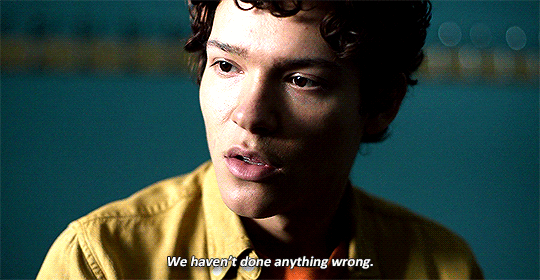

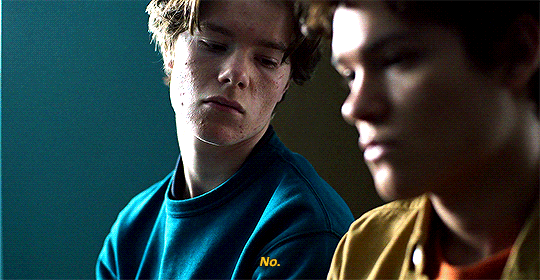
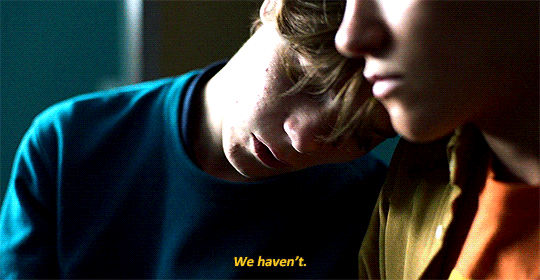
You’re right. We’re doing this together.
7K notes
·
View notes
Text
Day Two: Despite a Nap, We Did Well for Our Step Count
Our first full day in Stockholm began a little touristy. We felt that it was only proper to head to Gamla Stan, the "old city," with narrow stone streets and lots of little trinket shops. We had some local breakfast, which was just okay (Swedes love their mayo like Americans love ketchup) and hit the subway. Other than memorizing which station was at which end (imagine you didn't know if you were supposed to take the 2/3 train towards the Bronx or Brooklyn) the trains were easy, efficient, and clean. To get a ticket, you swipe the same way you do for OMNY. It made us realize how resistant New Yorkers are to change.
Gamla Stan is home to a lot of little touristy stops, but one that was on our list was Stockholm's Jewish Museum! Housed in their old synagogue, it told the story of their first Jewish immigrants, who were merchants and tailors, and the museum itself was in the space of the oldest synagogue as well. We learned about Swedish Jewish history and saw some really cool artifacts. I mean, check out this special Torah plate that has Sweden's signature three crowns on it.

It was also really cool to see modern Jews showing their culture and heritage entwined with Swedish nationality, such as these kippot, which looked more like art than hats.

There were so many other cool little shops we saw! Stores devoted to licorice, science fiction books (in English and Swedish), and Scandinavian clothes! We also took a stop into the Nobel Prize museum, which had a lot of documents and artifacts from their past winners, like a typewriter from a literature laureate, or a chess set from a science laureate. Albert Einstein's handwritten notes were on display as were Hewlett High School alumni Louise Glück's.
We may never be royals, but we did go up to a balcony by the royal palace! Rachel remembered one scene from Young Royals (on Netflix) was set here.
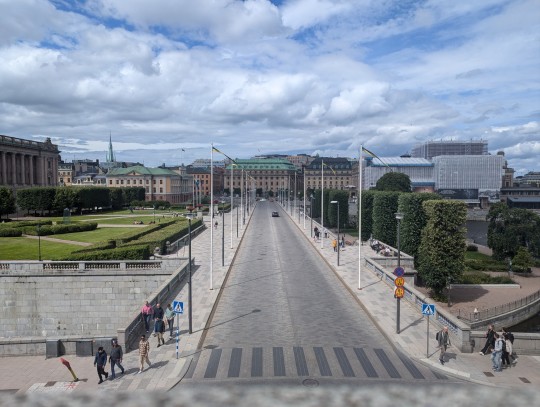
Like imagine a hundred thousand people down there. That's the scene.
With all that walking, we were ready for a nap. We went back to the apartment and legit crashed, relaxed, had some downtime, and got ready for dinner.
When you think of Swedish food what do you think of? Fish? How about MEATBALLS? We went to a TikTok famous restaurant called Meatballs for the People! And it looked like a restaurant we'd find back home.
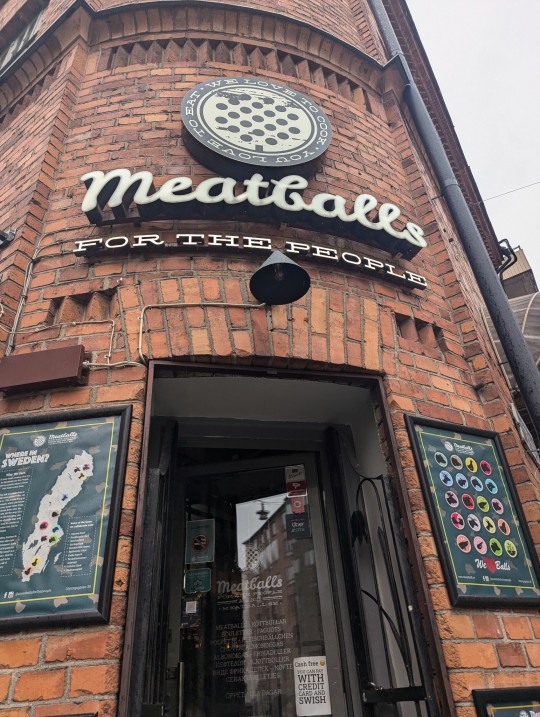
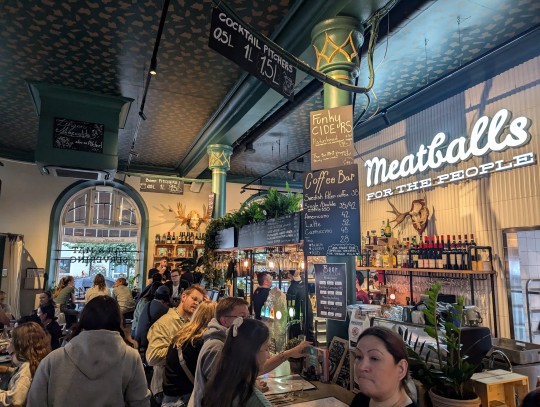
It was great, and all around this neighborhood, called Södermalm, we thought, gee doesn't this feel like Brooklyn? It reminded us a lot of Williamsburg.
We watched the end of the England v Switzerland match at a bar and walked around. We got great gin cocktails at a distillery and wandered the late evening as the sun set at 10.
Alex: So, Rach, what might you take away and remember most from today? Definitely not breakfast, right?
Rach: Definitely not breakfast. That mayo had cheese for sure so I didn't eat much...
I think the thing that will stick with me is the moment we sat by the water on the reclining benches, and closed our eyes and every time I opened them I saw this beautiful architecture and was so excited to be here with you. It was a little moment, but that's one I'll probably remember.
Alex: Oh, I have a picture of that. See?

Rachel: Haha what a terrible picture!
Alex: I couldn't see. The sun was in my eyes. The sun is out all of the time. But it's never hot, right? The weather is crazy.
Rachel: What are you talking about? This is my IDEAL weather! Rain and all!
Alex: The rain actually reminds me a lot of Seattle in lightness, but it only lasts an hour or something like that.
Rachel: What was your highlight from today?
Alex: For me it's definitely walking around Södermalm because it felt like the part of the city I was most comfortable with. I'm looking forward to going back and hanging there, maybe while you work some afternoons.
Rachel: I also loved walking around, going to a few bars and generally just enjoying each other's company.
Alex: Well I guess that's why we're here.
Rachel: 1000%!
Tomorrow our plan is to hit more museums and parks in the eastern side of Stockholm. Stay tuned!
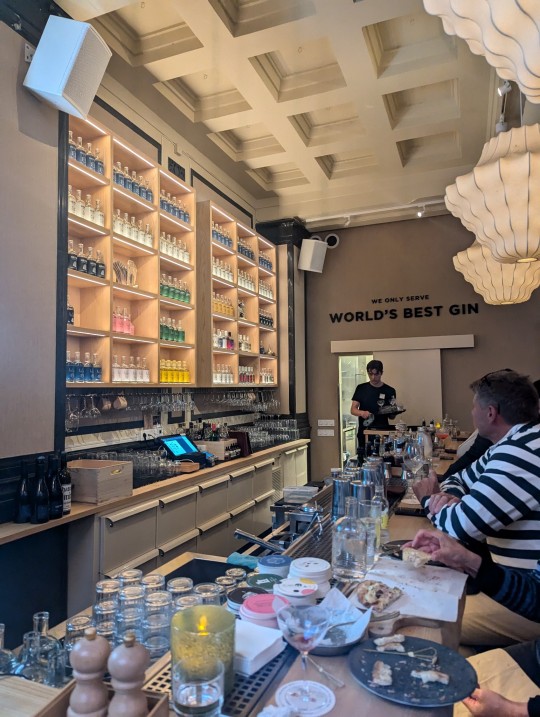
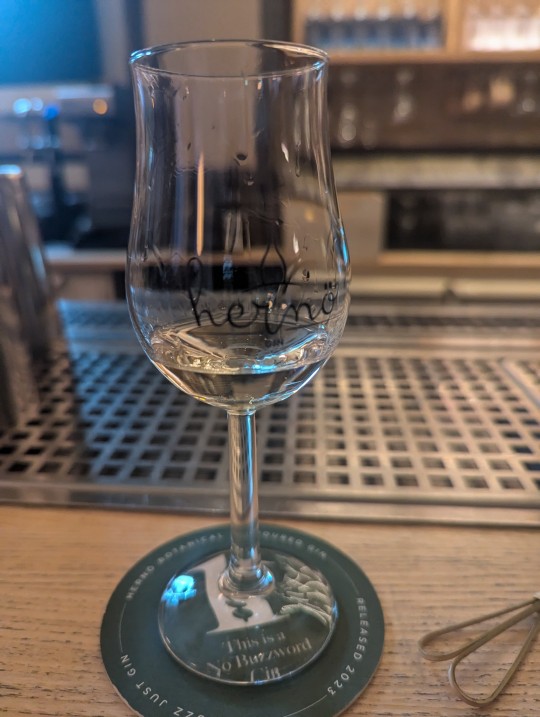
1 note
·
View note
Text
There’s a lot of people bringing valid criticism to Sweden and all the countries in Europe who have participated in colonialism. People are bringing into question a lot of cultural practices that are and have been harmful to minorities, ESPECIALLY black people and Muslims. But there’s also an issue that I want to bring up that I’ve seen well-meaning Americans do in this process:
When critiquing a country that you are not in, that you’ve never even been to, or even that you’ve been for… a year old less, there are nuances that you can miss. One thing that comes to mind is Americans making fun of the Stereotypical Bri’ish Accent, where they just did a Fucking Classism and lower class people from the UK, Welsh, Irish and the Scots got appropriately and rightfully fucking pissed. Americans did not understand why everyone was attacking them so viciously whenever they would do a hahah about their accent. How dare you bring up such a delicate topic such as school shootings when the whole internet is suddenly making fun of your accent the way people have done your entire life?! How dare you get so upset when we prod and poke at something that you actively have to change in order to get jobs and be respected by the high class?!
There was a case in Twitter where an angry Native American woman was critiquing Spain (rightfully so!) …..but she did it without knowing jack shit about Spain’s history. So as she was talking about colonisation, she was calling Spain that: SPAIN. None of you would know this, unless Spanish or knowing Spanish history, but Spain did not exist at the time of colonisation, it was CASTILLA. It was a Kingdom. And a very prominent fascist point is that it was Spain, it was a whole ass united country, because it plays into the rethoric that “Spain has been a country, wholly unified and homogenous, since its conception”. It undermines the mix of cultures that Spain actually is; it undermines that we are MADE with ARAB BLOOD, we have it deep in our country’s veins, our language and our food and our buildings and our way of life!
This native woman did not know. And so fascist Spanish twitter had a blast by picking on her, having fascists pile up on her so she’d keep being wrong and not see the well-meaning leftists saying “hey, YES, critique us, but please don’t say Spain has existed for this amount of time, because that’s wrong! Our country is not just white people, that’s also a fascist talking point!” Romani people from the south were especially pissed at this shit. This was huge in Spanish twitter, and a fascist politician from VOX even mentioned it and said, “The rest of the world knows we are an homogenous, unified country, and we must keep that reputation! That way is how we come back to the Golden Days of Spain!”
With this, I’m saying; critique Europe, PLEASE. Critique us, rip colonialism and the descendants of its privilege apart, but PLEASE, do not say shit like “socialism in Scandinavia can only work because of racism”, because that is a lie. Socialism can work ALONG people of color and immigrants, because people of color and immigrants fight tirelessly within these countries so that our systems work well, and keep being as good as they are. Rich, white politicians want to take it all away, want to keep colonialism as The Golden Days of Our Country, they WANT YOU ALL to think that Scandinavia has no people of color, no Muslims, no Chinese People.
My country, Spain, is a wonderfully diverse and culturally rich place that has had people of color since it became a country. It is a country that did not handle colonialism even well, and our hubris was what made it as ruinous as it is now. South and Central America deserve to critique and rip up apart, because WE PILLAGED AND RAPED AND DESTROYED and it is why the USA can do whatever it wants with a lot of these countries right now. Like many activists in my country say, “we came in thinking we were a big shot and all we did was ruin lives, including ours.” It’s the funniest thing, wish we had just ruined our country without colonisation first lmao.
Anyway, don’t make fun of accents. Don’t make fun of food, of how people dress, of how they talk and how they live. Don’t claim that Europe has no black people, no people of color. Listen to European activists of color when critiquing a country you do not know the history of. There’s no Wrong Accent, no Wrong Dialect, no Wrong Language, and to make fun of any is being a fucking classist most of the time. I just hope you all know, because THIS. IS. IMPORTANT.
I’m doing this is good faith, and I hope Americans who read this, do so in good faith, too. There’s so many people doing good work in Europe, trying to help immigrants and trans people and refugees, but do remember that this is an uphill battle for us as well. You’ve more in common with a lower class Andalucian Spaniard who had to change his accent because otherwise nobody would hire him or even give him a passing grade in Madrid than the upper class kid in Salamanca street who thinks Spain just has too many immigrants now, you know?
There’s nuance. There’s work to be done. So stop fucking saying fascists talking points, you idiots.
#swede gate#Nico.txt#Europeans can add stuff about their countries btw#I’d love to hear about France’s activism regarding the hijab ban#or how swedes work with immigrants#how Polish lgbt people and people of color are fighting the current policies#like#I want. to hear???#I want to know
645 notes
·
View notes
Note
"Some Swedish people, like this moron Johanna Fränden, has a very weird urge for self-annihilation. That’s why she’s celebrating that Sweden is now an unsafe country full of murders, rape, bombings and gang violence. Most of all exponentially more unsafe for women than a few decades ago. She even says this:
Tar de våra tjejer också? Det får vi nog dessvärre ställa in oss på, eftersom pojkar med utländsk bakgrund alltså i något större utsträckning genomför högre studier än svenskfödda diton, och att högutbildade män står högst i kurs på äktenskapsmarknaden.
Saying that immigrant men will ”take” Swedish women from the Swedish men because they are more intelligent. Who even talks like that? And why does she hate her own people so much? Is this what’s called ”white guilt” in English speaking countries?"
As a Swede I can say this anon is twisting Frändén's words with taking things out of context. The full quote is:
"Sverige står, efter det höga inflödet av framför allt yngre människor i arbetsför ålder under 2010-talet, bättre rustat än många andra EU-länder.
Det får mig att tänka på att den gamla nittiotalsinvändningen mot invandring 'de kommer hit och tar våra jobb' sannerligen inte saknar fog. 'De' kommer rentav hit, börjar arbeta OCH går om svenskar i akademin. Tar de våra tjejer också? Det får vi nog dessvärre ställa in oss på, eftersom pojkar med utländsk bakgrund alltså i något större utsträckning genomför högre studier än svenskfödda diton, och att högutbildade män står högst i kurs på äktenskapsmarknaden. Men det är en annan diskussion."
Secondly, anon isn't familiar with Frändén's style of writing and doesn't understand the format a column has compared to a regular news article. This column is meant to be ironic.
Frändén is one of the highest rated female journalists in Sweden who's won journalistic awards. She's highly intelligent, well educated, very much socially aware and has lived abroad for at least a decade and is fluent in English, Spanish, Italian and French. She's currently living in Paris and has other perspectives than someone who has never lived outside of Sweden.
Read her full column Amy and follow the links in it for her sources. These two are in English:
https://hbr.org/2017/04/why-mass-migration-is-good-for-long-term-economic-growth
https://www.lemonde.fr/en/france/article/2023/01/27/immigration-rose-in-france-in-2022-driven-by-labor-needs-and-foreign-students_6013360_7.html
Frändén is far from a moron. She actually has a point. There's been reports for several years now how boys doesn't do as good as girls in school, plus how the school results have been declining. A worrysome increased numbers of pupils finish 9th grade, högstadiet, with bad grades. It's also well known education is highly valued among immigrants, there's been studies and statistics backing it up. But we don't have to look further than to what Zecira Musovic has told us about her family and siblings.
I get the feeling this anon belongs to the group of people Frändén describes in her column:
"If you balk at that statement, it may be because you gather information from the Swedish media and that they, that is we, are bad at picking up long-term trends. It's been since forever: It will always be more news that an ethnicized gang war rages in Swedish cities than that the majority of immigrants in Sweden go to school and work to an ever greater extent.
The other alternative is, of course, that you listen too much to Swedish politicians, who in recent years have gone out of their way to point out immigration as a problem. Prime Minister Ulf Kristersson even called it 'a burden' in 2021.
It was strangely said for several reasons, not least because it is well known that immigration is generally a long-term economic plus story. In addition, the biggest winners of recent years' migration are those born in Sweden with good finances - that is, Ulf Kristersson's traditional voter base."
This anon reads to me as someone who doesn't like immigration. Wouldn't surprise me if it's the same person who's putting the whole blame on Reinfeldt, when in reality none of the political blocs be it the Moderates or Social Democrats in majority in the government have managed to solve the integration in a good way through the years even before the refugee wave in 2015. We have refugees who'd worked as doctors, nurses, civil engineers, teachers, biomedical analysts etc in their countries. They learnt Swedish but had a hard time to get other jobs than cleaning, bus- and taxi drivers, work within elderly care and the jobs the spoiled rotten Swedes didn't want. Some refugees or immigrants started their own companies, restaurants and food places for example.
I hope you get the picture Amy.
And in general immigration trends to be good to economies
0 notes
Text
Victoria 3. The Victoria games are essentially a detailed simulation of 19th century economies with politics and war serving as ways of manipulating the economy to your benefit (whether that's deciding tax rates and how much of that goes towards welfare, driving up the price of bullets, or directly stealing your neighbour's coal fields) while the actual buying/selling of goods is done by simulated population demographics.
Now, communism has two benefits:
One, a planned economy. Without this, the factories in your country can be, at best, subsidised by the government, but what they actually produce is decided by capitalists who are motivated by what will make the most profit, and in a fully 'free' (unsubsidized) economy will sink or swim on the fluctuations of (increasingly as time advances) global markets and leave their workers employment at the mercy of that.
Second, welfare. You can have this without the planned economy if you're some kind of social democrat, but essentially by passing laws that allow things like "minimum wages" and "schools" (its the 1800s the bar is low), working class people have more money to spend on consumer goods which increase profits for the factories which increase taxes for the country to invest in further welfare, and everything else. And in the game.
This also applies to multiculturalism, where treating foreigners as a disenfranchised underclass means they'll be struggling to pay for vegetables and couldn't dream of spending big on nice furniture, alcohol or modern electronics. Not treating immigrants like dirt also means more of them will want to come to your country, and pay your taxes, which pays for your welfare, etc. And in the game.
The main barrier to these laws is that landowners and capitalists hate them, and they typically have disproportionate voting rights so will severely slow their implementation. So the "optimal strategy" for the player is to agitate the communists enough that they stage a revolution, and when they seize the capital (the player could just move the army aside), since these welfare and economic policies are core to the ideology, they will be enacted immediately with the installation of a new government, no need to spend 50 years making pleading eyes at factory owners to achieve the same benefits via reform. And in the game.
Its by no means a perfect simulation, it is still fundamentally a simulation of market economies influenced by being written by a team of Swedes, but it does lead to reddit becoming very flustered, or apparently having completely unintentional reflections on leftist economic theory.
Came across the purest distillation of when games meet real politics.
Cities Skylines 2 recently updated where the developers ‘fixed’ the ‘high rent issue’ by removing landlords from the game and changing how rent is calculated.
Which is kinda antithetical to the whole realistic city building sim vibe they’re going for. Devs shouldn’t be duck out because they managed to simulate capitalism too closely.
#i know this reply has probably already been written a dozen times#but 'how can i achieve communism' is like the#'how do i deal with my troublesome aunt without getting caught' of crusade kings but for victoria
9K notes
·
View notes
Text
Yes ! Omar will do”Sommarprat” this year!! So happy for him that he gets to tell his story!
Being chosen as a “Sommarpratare” is compared to being be ennobled/knighted in Sweden. It’s huge 🥹.
He said in an interview that he has been an artist since he was 14 but that he has never let people into his personal sphere.
He says in an interview in SVT that he is close to, if not, 100% satisfied with the recording and that the producer Mark said that he had the right vibe. He says he wants people to get to know him. It will focus a lot on his childhood and his relationship to his mom and how it was for them to move to Sweden and get used to living here. It will also bring up how he entered the music industry. He feels like most people don’t really know him and this is a chance for those who wants to get to know him to do so.
I hope and think there will be new crumbs for us that has followed him and listened to “Framgångspodden” for example. But this format reaches so many more people so I get that the earlier years will be his focus since it is significant for understanding who he is and where he comes from. I also think it’s a good decision since it’s so much more difficult to talk about the present rather than reflections and insights from things you have already moved on from. Edvin covered the impact of YR release in his talk last year so Omar also need another angle. But I think it is a good way to invite people to get to know him. Hopefully more Swedes will let him into their hearts.
And I love love love that Mark Levengood is a producer. He is a Sommarprat expert and has made six talks himself already and will also do his seventh (!) Sommarprat this year. Puuh. But most of all he is a an amazing storyteller so I think he and Omar has created an emotional, personal talk with a great storyline and pace. Omar has so much to tell. Mark has immigrated to Sweden, is gay and just a lovely person who has the ability to see and make people comfortable and bring out the little extra in terms of reflections from the people he interviews. This is not an interview but they have worked closely together and I am sure they have brought out and selected the best stories in a beautiful way. Perfect match as producer.
Can’t wait to hear it, so proud of him 🥹

105 notes
·
View notes
Text
// Ok all the hot takes re ocean gate are getting to me, so, buckle up, this is a Rant. I’m a historian, and let me just say, these post make an excellent case for why studying actual real history, with nuance, and not whatever the current hot take designed to generate the most interest/attention/controversy, is. Clickbait “history” isn’t history, ya’ll. So, here’s some Titanic facts
1. The ship had lower class passengers too, because, contrary to popular belief, it wasn’t just a cruise ship for the top .01% of white society. (And even if it was, great to know that so many people think dying in a preventable tragedy is fine if you’re a rich white person.) 2. The ship was intended as a passenger liner that would bring folks from Europe to the U.S. Consequently, it had designated decks for different social groups. There weee super wealthy folks on the top deck, more middle class folks on the second, and the poor on the third, or steerage, deck. Most of the poor were immigrants coming to the U.S. to work. Btw, this is from ABC News. “About three times as many rich people sailing first class survived compared with poor people traveling in third class. Americans had a 15 percent higher survival rate than the British, Irish and the Swedes” 3. there actually were three people of color onboard the ship, too. From USA Today: “There was only one Black male passenger aboard the Titanic. Joseph Laroche was a Haitian-born, French-educated engineer. He was traveling to Haiti second class on the Titanic with his pregnant, French wife Juliette Lafargue and their two daughters. A biography of Laroche’s life describes him as an “anomaly” among the ship’s passengers. When the ship began to sink, Laroche placed his family on a lifeboat and stayed behind to help other women and children escape. Laroache did not survive, and his body was never found. Today his descendants live in Chicago.” So, presumably, the titanic was headed to Haiti, one assumes with the intent of acquiring more passengers, at least some of whom, presumably, would have been POC. 4. The type of discrimination laws like most Americans think of, the so called Jim Crow laws of the post reconstruction South, did not, shockingly, apply to the rest of the world, with some obvious exceptions, and the term Jim Crow originated in the north, in Massachusetts in regard to segregated rail travel. In fact, “Outside South Africa under the apartheid regime in the second half of the twentieth century, systematic racial segregation has been most closely associated with the Southern United States, from its introduction in the 1890s until it was gradually dismantled in the wake of the civil rights movement of the 1950s and 60s. ‘Jim Crow’, as it was known, actually emerged in the North in the 1840s, when the term was first used in Massachusetts to refer to the railroad cars reserved for black passengers. For a century or more, African Americans traveling to Europe often expressed their pleasure at being able—for a time at least—to mingle freely with others in public places.” 5. The primary barrier to people of color accessing the titanic was wealth and societal pressures/discrimination, not actual laws. 6. To bring it back to the Titan, one of the folks onboard is an actual teenager, and I happen to think kids, even filthy rich white kids, don’t deserve to die horribly. 7. Every single one of you making jokes about how “stupid” these people are is being ableist toward people with intellectual disabilities, so congrats on the rampant ableism.
Open a freaking history book, ya’ll and stop writing edgy hot takes about real people dying because you think it makes you sound cool.
4 notes
·
View notes
Text
Can I just quickly rant about my previous customer service job?
I am a native Finnish speaker living in Finland (my English is fine, my Swedish is terrible, and I understand verrryyy little of any other language, like just individual words).
I worked at a store in Helsinki, and we had a lot of tourists coming in (especially from Japan and Germany), a lot of Finno-Swedes, a lot of immigrants, a lot of international students and what have you. (Of course a lot of Finnish speaking Finns as well, but you know, this is about languages.)
And let me tell you, when you consider different languages, it becomes SO AWKWARD to guess, how you should greet people.
My technique was to greet everyone in Finnish (if I hadn't just heard them say "Hello" or something to me), because you know, I just didn’t want to assume someone's native language or the languages we could use.
NOTE: Literally, like 99% of customers were completely fine, no matter what the language was, but there were these cases where people got mad I didn’t read minds.
Some language-related problems I had / someone else had with me:
Customer says "Helou" (with a heavy european accent) -> I greet him in English, and continue talking to him in English -> He goes "Eiku kyllä mä oon ihan suomalainen". ("No, I'm Finnish.")
Group of people talks English with each other -> one buys something -> talk in English to the buyer -> gets mad, because is actually Finnish with international friends
Say "Päivää" -> get corrected, it's only morning, you should say "Huomenta"
Say "Huomenta" at the same time some other day -> "I think we can already say 'Päivää'." *smug face*
Try to target these people with "Hyvää aamupäivää." -> profit
Greet someone in Finnish / Swedish / English -> not a word during the whole interaction -> after reveals they don’t speak said language, and it's so UNBELIEVABLE that you should have so speak this language in your local store and I just- WHY DIDN’T YOU FUCKING SAY ANYTHING???? I could have switched????
Old Finnish-speaking people in a huge huff when they misheard me. (I said "Hei", they heard "Hi", and got upset.)
I actually heard a person say "Hi", when they said "Hei". -> Speak English, and yeah, they didn’t like it.
Trying REALLY REALLY REALLY HARD to hear if people say "Hei." or "Hej." (Or "Hi.") -> Sometimes accidentally stare at the mouths of the customers.
Say "Päivää" to an old lady -> get huffed and puffed at, because I didn’t notice that the books she bought were in Swedish, and therefor she should have obviously been greeted in Swedish. -> Ok. Apologize, switch to Swedish, and still she leaves in a grumpy manner.
Notice some other customer's books that are in Swedish -> speak Swedish -> get an "Eiku mä oon ihan suomalainen."
Be from Eastern Finland -> A person comes towards you and says "Hei hei". -> ?????????
A Danish person asks if I speak Swedish or German. -> "Only some Swedish, not German." -> "Okay, well, I'll try English." -> She then goes from English (in like two seconds) into Swedish (now I get some of what she's saying, into German (WAIT, WHAT?), and then into Danish, and I'm there standing like.. Umm.. I got like 5% of what you just said.
Two people at the line thought it was their turn next. One spoke English, one Finnish. -> I had to tell them both in different languages, that no, it was actually this third person, who was next
I didn’t usually work in the section that had the kids' stuff in it. Therefore didn't know that "Peppa Pig" / "Pipsa Possu" was something like "Greta Gris"? in Swedish, and I swear, one tired mother looked at me like I had been living under a rock when I said I didn’t know what that was.
And you know, other stuff.
There's so much pressure as a foreigner to just say hello in Finland. You have to choose between Hei, Moi, Heippa, Moikka, and Terve. Not to mention Huomenta and Päivää. The foreigners sort of silently agreed upon Hei, as it feels the most familiar but I don't want to be a basic bitch so it's always an internal struggle of which one to choose.
707 notes
·
View notes